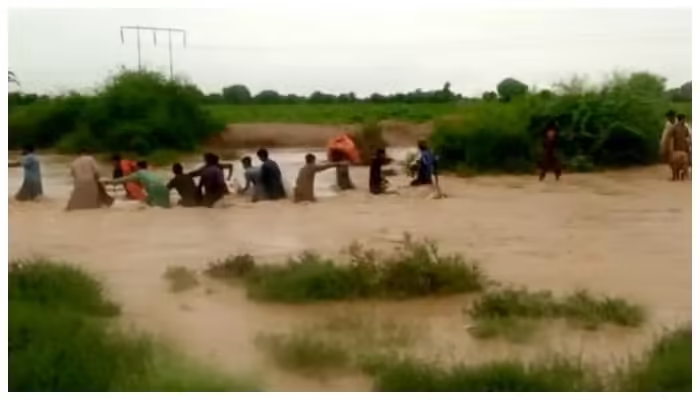In the wake of heavy monsoon rains across various cities in Balochistan, Pakistan, devastating floods have left a trail of destruction, affecting thousands of lives and causing widespread damage to infrastructure, agriculture, and homes. The regions of Jafarabad, Naseerabad, Jhal Magsi , Qibla Abdullah, Qibla Saif Allah, and Ziarat are among the hardest hit, with the victims now desperately awaiting assistance under the open sky.
Stranded and Starving: The Plight of Flood Victims in Jafarabad and Naseerabad
In Jafarabad and Naseerabad, the situation is particularly dire as flood victims continue to endure harsh conditions. With their homes submerged and livelihoods destroyed, many are left with no shelter and are waiting for aid in the open. The shortage of food has become a critical issue, with reports indicating that affected areas in Naseerabad have been facing food scarcity for three consecutive days. The lack of proper nutrition is compounding the already dire situation, leaving the affected population in a state of despair.
The floodwaters have also severely impacted access to medical facilities, making it difficult for the injured and ill to receive the necessary care. The scarcity of medical supplies and the inability of healthcare workers to reach the affected areas have only exacerbated the crisis. As the days pass, the urgency for emergency relief grows, with calls for immediate intervention from both government and non-governmental organizations.
Infrastructure in Ruins: Balochistan’s Communication and Transport Network Paralyzed
The heavy rains have not only affected the lives of the people but have also brought Balochistan’s already fragile infrastructure to its knees. The communication roads in Jhal Magsi have become dilapidated, with major routes now impassable due to flood damage. The Machka River in Qila Abdullah overflowed, inflicting severe damage to gardens, crops, and homes, further worsening the economic plight of the local population who rely heavily on agriculture.
In Qila Saifullah and Ziarat, the floods have swept away numerous roads, bridges, and houses, cutting off entire communities from the rest of the region. The Ziarat-Quetta highway, a critical transport route, has been rendered unusable, leaving many areas isolated and hindering the delivery of much-needed aid.
Disrupted Transport: Train Services Suspended, Railway Losses Mount
Adding to the woes, train services across Balochistan have been suspended due to the combined effects of heavy rainfall and recent terrorist attacks in the region. The suspension of rail services is causing significant disruptions in the movement of people and goods, leading to a daily loss of approximately 1.5 million rupees for the Pakistan Railways. This loss further strains the already limited resources available to respond to the disaster.
The halt in train operations has left many passengers stranded, with no alternative means of transport available. For those in the flood-affected areas, the lack of train services has cut off a vital lifeline for evacuation and the delivery of essential supplies. As the situation drags on, the economic impact on the region is expected to worsen, with long-term consequences for Balochistan’s recovery.
Tragic Loss of Life: Flooding Claims Lives in Ziarat and Surrounding Areas
The human toll of the flooding is becoming increasingly evident as reports of casualties emerge. In Ziarat, two people lost their lives when their vehicle was swept away by the raging waters of the Biji River. The incident underscores the deadly force of the floods and the danger faced by those attempting to navigate the treacherous conditions.
As the region grapples with the immediate aftermath of the floods, the focus is on rescuing those still stranded, providing relief to the affected populations, and beginning the arduous task of rebuilding. However, with the monsoon season far from over, there is a looming fear that further rains could exacerbate the already catastrophic situation.
The Need for Urgent Action
The ongoing crisis in Balochistan highlights the urgent need for coordinated disaster response efforts. The federal and provincial governments, along with international aid organizations, must prioritize the provision of food, shelter, medical care, and rebuilding infrastructure to prevent further loss of life and mitigate the long-term impact on the region’s economy and communities.
The floods in Balochistan serve as a stark reminder of the vulnerabilities faced by remote and underdeveloped regions in the face of natural disasters. Without immediate and sustained assistance, the affected populations will continue to suffer, and the path to recovery will be long and challenging.



